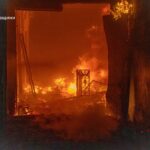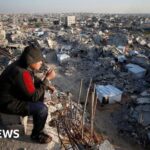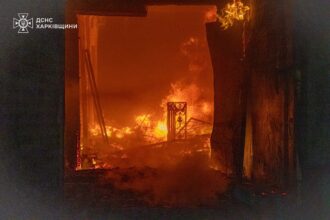Israel began its ground invasion of southern Lebanon on 1 October. Iran launched 180 missiles at Israel shortly after.
Fears of a regional conflict in the Middle East are high, as long as the war in Gaza continues.
What is the danger of further escalation in this situation? BBC InDepth asked a variety of experts to give their analysis on why the conflict escalated and what could happen next.
What is Israel’s long term goal in Lebanon?
Israel appears to have changed its goal from weakening Hezbollah in order to enforce a ceasefire agreement that secures Israel’s north to trying to neutralise Hezbollah forever. Israel’s military campaign will not make Hezbollah vanish, despite the fact that it has inflicted huge losses on Hezbollah.
It’s difficult to tell the difference between what the government says and what they do on the ground. They claim to be removing Hezbollah’s threat to protect civilians who live on sovereign territory in Northern Israel and who need to return to their homes after a year of being displaced by the rocket fire of Hezbollah. Hezbollah joined the fight against Hamas following October 7. This government has also religious forces that are presenting a cosmic vision for conquest, not a strategy. We can’t exclude the possibility that there is an expansionist ethos.
Israel wants the Lebanese government to reassert its authority over Hezbollah. This reminds me a lot of the 1982 Israeli ground campaign in Lebanon against the Palestinian Liberation Organisation. This didn’t work out well for Israelis living near the Lebanese frontier in the long run. In this case, Israel will need to focus its efforts on the short-term gains of calming down the situation so that the displaced 60,000 residents in northern Israel can return home.
Has the map of the Middle East already begun to change? If so, in what way?
The Middle East’s power balance is shifting in a direction that is reducing Iran’s influence. Any change in the status-quo will take time to manifest.
It’s still too early to draw that conclusion. But it’s clear that the Iran-led axis has been weakened and Israel appears to have made some significant tactical gains. It remains to be determined if Israel can turn these tactical gains into strategic ones through diplomacy.
Not the map but the balance of power is certain. In the last 20 years, Iran, its proxies Hezbollah and Hamas, and Israel have been able to hold each other at a draw. This is mutual deterrence. This was shattered by the 7th of October, and Israel now wants to gain the upper hand.
It’s still too early to tell. It’s too early to tell.
What does this mean in terms of Iran’s nuclear enrichment and the possibility of nuclear weapons?
The fact that Iran is losing Hamas and Hezbollah, as deterrents, means that a growing number of figures within the Iranian establishment will want to develop a nuke weapon.
What does this mean in reality? When will Israel know? Israel’s intelligence in Iran is quite good – will Israel know if Iran starts building a weapon next week? Iran is entering a very dangerous area if it goes ahead. Iran’s conventional military capability is a joke in comparison to Israel’s. It has therefore relied on nontraditional means, such as militias, which have proven to be of little value.
Israel is concerned about the nuclear ambitions of Iran for obvious reasons. The anti-Israel animus is still at the core of the regime. Ayatollah Khamenei’s oldest and most important demand is to destroy Israel. It’s his only project, and the only one in which the Islamic Republic has been able advance.
There is, however, a more pragmatic element in the Iranian political establishment that is often forgotten and believes Iran has no right to fight the Palestinian war on behalf of the Palestinians.
Iran will do everything it takes to protect its nuclear program. Iran will consider an Israeli attack on the nuclear programme as a existential threat.
In the Iranian view, going nuclear could be the only thing that can truly change the game. I don’t really know what that means – they may have a capability and could demonstrate it through a nuclear test somewhere in the desert.
Does the spread of conflict make it more difficult for Israel to achieve their goals in Gaza?
Israel’s expanding campaign has sown anger among Middle East populations sympathetic to the Palestinian cause. This makes peace in the future more difficult.
Israel will be stretched thin if it engages in a larger conflict, especially since Hamas is still not eradicated from Gaza. Israel still receives the support of the United States.
Israel has been fighting for over a year in Gaza. There has been a major destruction of Hamas Brigades and a serious loss of fighters. Israel’s inability to envision an alternative governing body is the biggest obstacle to achieving its goals in Gaza. Israel’s forces are not being overstretched, but it needs a political framework for a government that promotes Palestinian self-determination with international and Palestinian support. Gaza will remain a constant military drain and a threat without that.
Israel can’t achieve its goals in Gaza, because it has no political goal – and never had one. It went to war with no purpose. This could be Israel’s Achilles heel. Netanyahu may not feel the need to achieve any kind of political result, because he knows that he has the Western world’s support.
Will the winner of the US election in November be able exert any influence on the Israeli military operation.
Any American president could exert influence over Benjamin Netanyahu, if they so desired. None of them thought it was beneficial. Kamala Harris is less prone to long-term baggage in her desire to provide unconditional support to Israel than Joe Biden, but her party remains divided. On one side, there is strong support of Israel, while on the other, some call for an arms embargo. The voices of the Democratic Party who want to limit Israel in some way are growing. Trump is a wildcard. He is a wildcard.
I think Donald Trump could have more influence than Kamala. He’s more pro-Netanyahu or at least pro right-wing Israel but he is against the US getting into war.
A US administration that provides $10bn (PS7.6bn), to aid Israel’s military operation, will have leverage. This is especially true as Israel’s economic situation is deteriorating. The question is if there is a US politician in a real position of authority who will be willing to absorb the domestic political cost of using this leverage. Neither party has any. Ronald Reagan and George HW Bush are not in the future.
What are some of the possible ways that a wider conflict could possibly be avoided?
With every missile or air strike launched, it becomes harder to pinpoint the exact location.
I am pessimistic regarding the prospects for de-escalation… Most likely, the perception among the Israel Defence Forces (IDF) and the political level in Netanayhu’s war cabinet is they have the momentum. When one side feels it has the upper hand, it is not wise to give up because it can continue to exert pressure on its opponent.
This conflict cannot be won by any of the parties involved. Diplomacy is ultimately the only path to stability.
There are two obvious exits. Israel must accept a Gaza ceasefire that will allow humanitarian aid to move and allows for a new Palestinian government that Palestinians will choose, not Israelis or Americans. The second is a ceasefire that will see Hezbollah stop rocket/missile launches on Israel in exchange for Israel ceasing its airstrikes.
I don’t believe Netanyahu is looking for an off-ramp. The only way to get off the cliff is if Iran made major concessions, including a change in Iranian policy. This would include the nuclear program, but also the support for Hezbollah, Hamas, and Hezbollah. It’s not likely to happen, but it would be a possible off-ramp.
In Lebanon, a ceasefire is the only way out. An agreement on new security arrangements for the south would be the next step. This option is not available before the end this year, and we are still waiting for a new US administration.
There is no way out unless the US, and other major Western countries, make it their mission to change the course of events in the Middle East.
Dahlia photo credit: Oren Ziv
Photo credit: Getty
BBC InDepth, the new website and app, will feature the best analysis from our top journalists. We’ll be bringing you new perspectives that challenge assumptions and deep reporting on major issues to help make sense of an increasingly complex world. We’ll also be showcasing some of the most thought-provoking content on BBC Sounds and iPlayer. We’re starting out small but we have big plans. Please let us know what you think by clicking the button below.
Read More @ www.bbc.com













